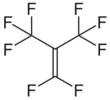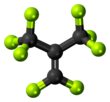Chemistry:Perfluoroisobutene
| |||
| Names | |||
|---|---|---|---|
| Preferred IUPAC name
1,1,3,3,3-Pentafluoro-2-(trifluoromethyl)prop-1-ene | |||
| Other names
Perfluoroisobutene, Perfluoroisobutylene, Octafluoroisobutylene, Octafluoro-sec-butene, PFIB
| |||
| Identifiers | |||
3D model (JSmol)
|
|||
| ChEMBL | |||
| ChemSpider | |||
| EC Number |
| ||
PubChem CID
|
|||
| RTECS number |
| ||
| UNII | |||
| |||
| |||
| Properties | |||
| C4F8 | |||
| Molar mass | 200.030 g/mol | ||
| Appearance | colorless gas | ||
| Density | 8.2 g/l | ||
| Melting point | −130 °C (−202 °F; 143 K) | ||
| Boiling point | 7.0 °C (44.6 °F; 280.1 K) | ||
| Hazards | |||
| GHS pictograms |  
| ||
| GHS Signal word | Danger | ||
| H330, H370 | |||
| P260, P264, P270, P271, P284, P304+340, P307+311, P310, P320, P321, P403+233, P405, P501 | |||
Except where otherwise noted, data are given for materials in their standard state (at 25 °C [77 °F], 100 kPa). | |||
| Infobox references | |||
Perfluoroisobutene (PFIB) is the perfluorocarbon counterpart of the hydrocarbon isobutene and has the formula (CF3)2C=CF2. A fluoroalkene, it is a colorless gas that is notable as a highly toxic perfluoroalkene. Few simple alkenes are as toxic.
Safety
Perfluoroisobutene is highly toxic with an LCt = 880 mg⋅min⋅m−3 (mice).[1] It is a Schedule 2 substance of the Chemical Weapons Convention.
Perfluoroisobutene is highly reactive toward nucleophiles. It hydrolyzes readily to give the relatively innocuous (CF3)2CHCO2H, which readily decarboxylates to give hexafluoropropane. It forms addition compounds with thiols, and it is this reactivity that may be related to its toxicity.[1]
PFIB is a product of pyrolysis of polytetrafluoroethylene (PTFE), one of the substances invoked to explain polymer fume fever.
See also
References
- ↑ 1.0 1.1 Timperley, Christopher M. (2000). "Highly-toxic fluorine compounds". Fluorine Chemistry at the Millennium. pp. 499–538. doi:10.1016/B978-008043405-6/50040-2. ISBN 9780080434056.
External links
 |


